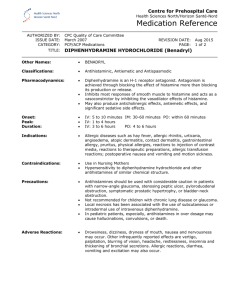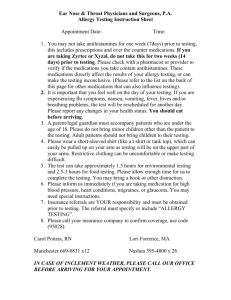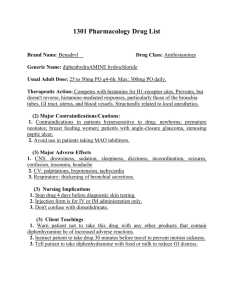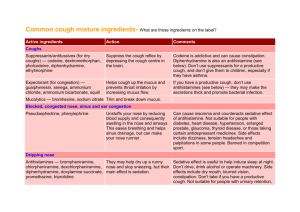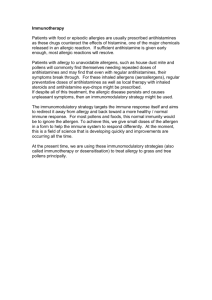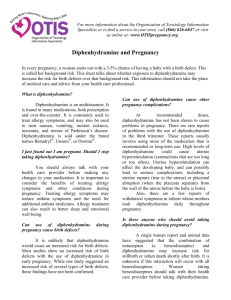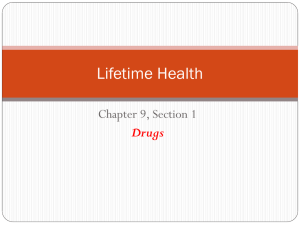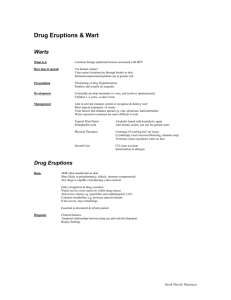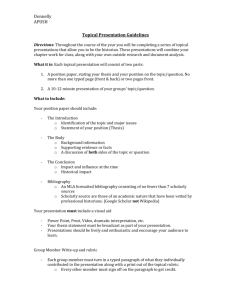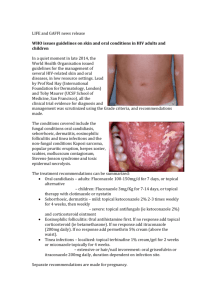Itch Relief - Summit Pediatrics Home Page
advertisement
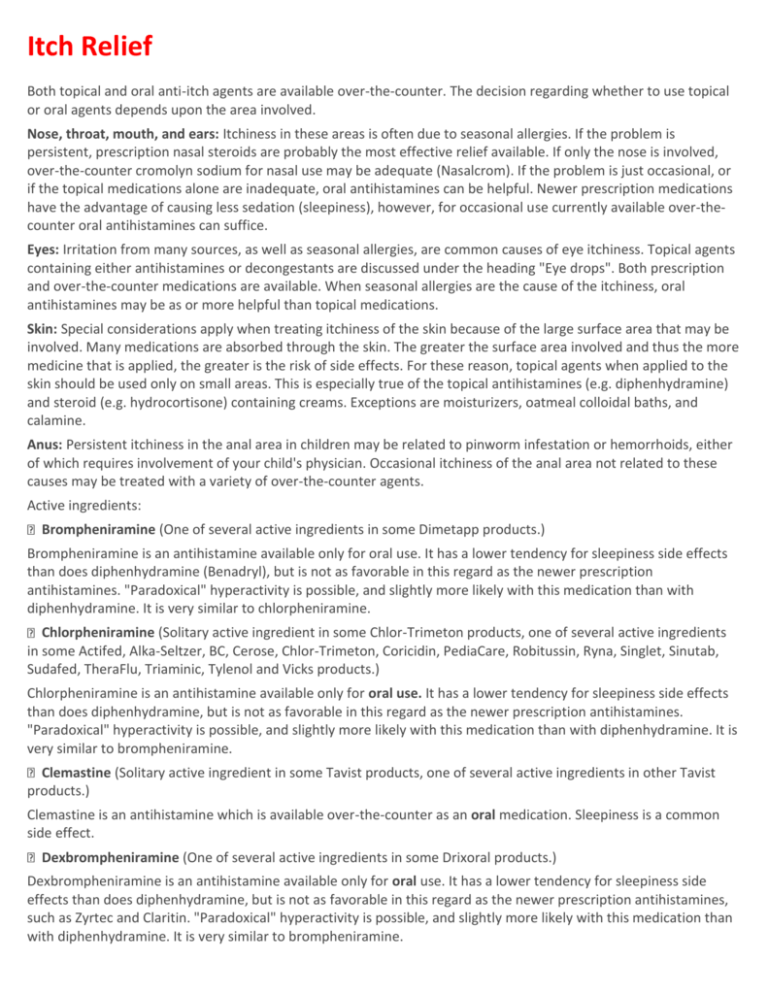
Itch Relief Both topical and oral anti-itch agents are available over-the-counter. The decision regarding whether to use topical or oral agents depends upon the area involved. Nose, throat, mouth, and ears: Itchiness in these areas is often due to seasonal allergies. If the problem is persistent, prescription nasal steroids are probably the most effective relief available. If only the nose is involved, over-the-counter cromolyn sodium for nasal use may be adequate (Nasalcrom). If the problem is just occasional, or if the topical medications alone are inadequate, oral antihistamines can be helpful. Newer prescription medications have the advantage of causing less sedation (sleepiness), however, for occasional use currently available over-thecounter oral antihistamines can suffice. Eyes: Irritation from many sources, as well as seasonal allergies, are common causes of eye itchiness. Topical agents containing either antihistamines or decongestants are discussed under the heading "Eye drops". Both prescription and over-the-counter medications are available. When seasonal allergies are the cause of the itchiness, oral antihistamines may be as or more helpful than topical medications. Skin: Special considerations apply when treating itchiness of the skin because of the large surface area that may be involved. Many medications are absorbed through the skin. The greater the surface area involved and thus the more medicine that is applied, the greater is the risk of side effects. For these reason, topical agents when applied to the skin should be used only on small areas. This is especially true of the topical antihistamines (e.g. diphenhydramine) and steroid (e.g. hydrocortisone) containing creams. Exceptions are moisturizers, oatmeal colloidal baths, and calamine. Anus: Persistent itchiness in the anal area in children may be related to pinworm infestation or hemorrhoids, either of which requires involvement of your child's physician. Occasional itchiness of the anal area not related to these causes may be treated with a variety of over-the-counter agents. Active ingredients: Brompheniramine (One of several active ingredients in some Dimetapp products.) Brompheniramine is an antihistamine available only for oral use. It has a lower tendency for sleepiness side effects than does diphenhydramine (Benadryl), but is not as favorable in this regard as the newer prescription antihistamines. "Paradoxical" hyperactivity is possible, and slightly more likely with this medication than with diphenhydramine. It is very similar to chlorpheniramine. Chlorpheniramine (Solitary active ingredient in some Chlor-Trimeton products, one of several active ingredients in some Actifed, Alka-Seltzer, BC, Cerose, Chlor-Trimeton, Coricidin, PediaCare, Robitussin, Ryna, Singlet, Sinutab, Sudafed, TheraFlu, Triaminic, Tylenol and Vicks products.) Chlorpheniramine is an antihistamine available only for oral use. It has a lower tendency for sleepiness side effects than does diphenhydramine, but is not as favorable in this regard as the newer prescription antihistamines. "Paradoxical" hyperactivity is possible, and slightly more likely with this medication than with diphenhydramine. It is very similar to brompheniramine. Clemastine (Solitary active ingredient in some Tavist products, one of several active ingredients in other Tavist products.) Clemastine is an antihistamine which is available over-the-counter as an oral medication. Sleepiness is a common side effect. Dexbrompheniramine (One of several active ingredients in some Drixoral products.) Dexbrompheniramine is an antihistamine available only for oral use. It has a lower tendency for sleepiness side effects than does diphenhydramine, but is not as favorable in this regard as the newer prescription antihistamines, such as Zyrtec and Claritin. "Paradoxical" hyperactivity is possible, and slightly more likely with this medication than with diphenhydramine. It is very similar to brompheniramine. Diphenhydramine (Solitary active ingredient in some Benadryl products.) (Also, solitary active ingredient in some Nytol, Sleepinal, Sominex, and Unisom products which are not marketed as anti-itch agents.) (Also, one of several active ingredients in many cough, cold and flu products.) Diphenhydramine is an antihistamine. Diphenhydramine is a useful medication to have in your medicine cabinet. Besides its anti-itch effects, diphenhydramine has anti-nausea, anti-cough, and antispasmodic effects. (The latter is helpful for some crampy abdominal pain.) The side effect of sleepiness may be desirable or undesirable depending upon the circumstances. "Paradoxical" hyperactivity is possible with this medication. For anti-itch, diphenhydramine is available as an oral solution, generally 12.5 milligrams in 5 milliliters, or as a topical cream. The creams and gels do get absorbed from the skin into the blood stream, thus should only be applied to small areas. During chickenpox it is important to remember not to give oral diphenhydramine and topical at the same time--this can result in seizures. Doxylamine (Solitary active ingredient in some Unisom products which are not marketed as anti-itch medications, one of several active ingredients in some Alka-Seltzer, Tylenol, and Vicks products.) Doxylamine is an antihistamine available only for oral use. It is in the same class as diphenhydramine, thus sleepiness is a significant side effect, but "paradoxic" hyperactivity is possible. Pheniramine (One of several active ingredients in some Visine products) Pheniramine is a topical antihistamine available as eye drops used to relieve itchiness due to minor irritation or allergy. Because of the small amounts used when applied to the eye, the sleepiness seen with oral antihistamines is not seen with this medication. Pramoxine (One of several active ingredients in some Anusol, Betadine, Caladryl, and Neosporin products.) Pramoxine is a topical anesthetic agent that can be helpful for itching in the anal and skin surface areas. It is not taken internally in any form. Caladryl contains diphenhydramine (Benadryl), and therefore, should not be given concurrently with oral diphenhydramine when treating chickenpox.
